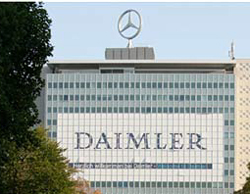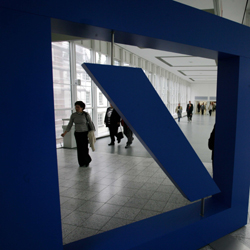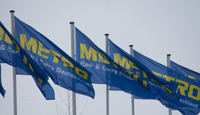ACTIONS CORNER
 On 18 May, in San Francisco, California, a civil compensation suit against Daimler for multiple murder, torture and other human-rights violations against workers in its Argentine plant was allowed before the Court of Appeal. 22 Argentines, who want to call the car company to account for the disappearance of at least 14 unwelcome trade unionists and Works Council members in its consolidated subsidiary in the years 1976 and 1977 during Argentina's military dictatorship, are preparing the action.
On 18 May, in San Francisco, California, a civil compensation suit against Daimler for multiple murder, torture and other human-rights violations against workers in its Argentine plant was allowed before the Court of Appeal. 22 Argentines, who want to call the car company to account for the disappearance of at least 14 unwelcome trade unionists and Works Council members in its consolidated subsidiary in the years 1976 and 1977 during Argentina's military dictatorship, are preparing the action.
The U.S. government has filed a civil suit in a federal district court in New York against Deutsche Bank and its subsidiary Mortgage IT, demanding a total of one billion dollars. It concerns fraud in connection with mortgage-financing transactions. The bank and its mortgage subsidiary repeatedly gave false information regarding the quality of mortgages so as to benefit from the Federal Housing Administration Program, alleges the petition. Regardless of borrowers’ ability to pay, the mortgages were introduced into the government insurance program and subsequently sold.
 On 3 May Deutsche Bank confirmed that the city of Los Angeles too has filed a lawsuit in connection with the abandonment of hundreds of foreclosed homes and for wrongful eviction. It says the bank is the biggest exploiter in the metropolis and has violated federal, state and local law. LA is calling for compensation payments worth hundreds of millions of dollars for itself and numerous inhabitants. The leading German bank feels wrongly accused. In their role as trustees they were not responsible for the foreclosures.
On 3 May Deutsche Bank confirmed that the city of Los Angeles too has filed a lawsuit in connection with the abandonment of hundreds of foreclosed homes and for wrongful eviction. It says the bank is the biggest exploiter in the metropolis and has violated federal, state and local law. LA is calling for compensation payments worth hundreds of millions of dollars for itself and numerous inhabitants. The leading German bank feels wrongly accused. In their role as trustees they were not responsible for the foreclosures.
Rolf-Ernst Breuer on 25 May rejected a settlement in criminal proceedings in which he is charged with attempted fraud. The former Deutsche Bank chief executive denies having lied in court in connection with the Kirch bankruptcy, and urges acquittal. The court could not prove collusion to the detriment of Kirch. On 19 May Josef Ackermann as a witness denied the accusation that they had deliberately driven the Kirch media group into a corner in early 2002, in order to obtain an advisory mandate for winding up the group. Similarly, added Clemens Börsig, no one on the board had been interested in taking on a mandate to restructure the media group.
Deutsche Telekom is in a dispute with its major shareholder over 112.5 million euros it had to fork out for a settlement with shareholders in the United States. U.S. investors had accused the telecommunications group in a class action after the IPO of, among other things, not having given enough information in the prospectus about the state of negotiations on the Voicestream acquisition. The former state company is, according to the German Federal Court of Justice, assuming that it has a claim for compensation. The federal government had not only profited from the IPO, but at the time brought about the settlement as the dominant company, and must therefore pay.
Former T-Online shareholders have failed at the German Federal Constitutional Court with their constitutional complaint against the court-set additional payment after the merger into Deutsche Telekom. The court dismissed the case on the grounds that no constitutional rights had been violated. Entities of enterprises, including corporations, can be fused together by absorption. The eleven complainants were shareholders of the formerly publicly traded Telekom subsidiary, which suffered losses after its IPO in 2000 and was merged with the parent in 2005.
 The Ingolstadt District Court has set the first hearing, after a complaint by Erich Kellerhals against METRO. The personal appearance of the parties was ordered for 19 July. The minority shareholder accuses the holding company of the Media Markt and Saturn chains of wanting to deprive minority shareholders at Media-Saturn of their co-decision rights. The parent company has, however, stressed it wanted appropriate exercise of the rights deriving from its majority share of 75 percent. The Kellerhals holding company holds 21 percent of the retail group
The Ingolstadt District Court has set the first hearing, after a complaint by Erich Kellerhals against METRO. The personal appearance of the parties was ordered for 19 July. The minority shareholder accuses the holding company of the Media Markt and Saturn chains of wanting to deprive minority shareholders at Media-Saturn of their co-decision rights. The parent company has, however, stressed it wanted appropriate exercise of the rights deriving from its majority share of 75 percent. The Kellerhals holding company holds 21 percent of the retail group
A Texas jury has imposed a penalty of $345,000,000 against SAP for infringement of a Versata Software patent. The German software giant is considering taking action against its legal defeat. In the four-year-old patent dispute with the largely unknown U.S. company, the DAX group had been sentenced in 2009 to a payment of nearly $138,000,000, which the Walldorf firm had also made. But the proceedings were re-opened, because the damage calculation was incorrect. A court ruling has now laid down a more expensive figure, towards which the payments already made will be charged.
Munich District Court is staying the bribery trial of Thomas Ganswindt for a cash payment in the amount of €175,000. The accused has to pay the sum to charities. The guilt of the former Siemens executive was less than originally predicted, reasoned the court’s decision. The prosecution had charged him, in connection with the corruption scandal, with knowledge of illegal payments, breach of supervisory duties and tax evasion. In the civil case Siemens is seeking five million euros in damages; proceedings are to begin in October.
A Court of Arbitration of the International Chamber of Commerce in Paris has ruled that Siemens breached contracts in connection with its exit from the former joint venture Areva NP. The content of the infringements was not announced. The German technology company has to pay its nuclear partner €648 million plus interest. This is the highest amount the arbitrator could set. In addition, the Court confirmed a competition clause under which the DAX group may make no competition in nuclear technology with the French until September 2013. The Munich group is asking the European Commission to verify the validity of the clause.















